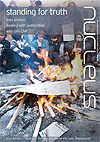I recently finished a twelve week long student selected module (SSM) on Christian Medical Ethics at the University of Leicester. As part of the medical curriculum, the SSM runs in the latter half of our second year. You may ask, 'what is an SSM?' Well, let me explain.
The module provides students with the opportunity to choose one of a range of topics in which they might have a particular interest. It allows for flexibility and diversity within the undergraduate course. Due to the range of subjects available, the SSM is not examined in our standard medical school examination, and is instead graded separately from the core subjects. Examples of available topics included: Clinically Applied Anatomy, Vascular Biology, Physiological Measurement, Health and Development, and Spanish for Medics. Considering the wide range of pursuits available, why then did I choose to study Christian Medical Ethics?
Well I guess the answer lies, somewhat, in the name. Rather than feeling compelled to pick a topic centred on Christianity, I found that these topics combined presented an interesting mix. All of us, from the moment we become Christians, will begin to learn how Christ thinks. As we grow in our relationship with him and internalise his word, we increase our knowledge of what his 'ethics' are. In a similar way, at medical school we start to understand some of the common ethical values we are expected to embrace. Be it formally or informally, we are taught about medicine's ethics. For some, it is easy to integrate both realms of knowledge. However for others (particularly for certain issues), the distinction between our 'medical' and 'Christian' thinking is more clearly marked.
How often do I get the opportunity to learn about Christian perspectives in medical ethics courtesy of my medical school? How great would it be to turn a mundane conversation on chosen modules into an opportunity to declare my faith? Finally, how many chances will I have to be assessed on a topic that I am already so intimately acquainted with? These were just a few of the thoughts that crept into my mind as I selected my SSM. The first two proved to be truer than I could imagine, however the last, like many statements made in arrogance, was thrown back in my face.
The module started with a brief introduction to belief systems and a general discussion on the concept of ethics. In the consultation setting, we were asked to consider the importance of a patient's belief system and its influence on medical management. Learning about the process of ethical reasoning provided the structure for much of our future discussions. Topics such as this were new and very interesting. I had never considered the concept of an ethical cycle (a process through which a decision is made), and certainly had noidea what a deontological argument (an argument based on rules) was. Yet this was what the module offered - concepts I had failed to see initially. It was not just another opportunity to debate my views on X or my thoughts on Y. It was designed to teach us how to take our often preformed ideas on what was or wasn't ethically justifiable and place them in a reasonably robust framework. Such a framework would allow us to not only defend them in a discussion, but if necessary, challenge and critically review them.
Topics such as abortion and euthanasia were covered; however less commonly discussed topics such as resource allocation also came up for debate. The most informative part of the course did not lie in the range of topics covered, but rather in the range of opinions that manifested. Although the module was open to all, those who had chosen it on this occasion were Christians. However, the extent to which people's opinions differed both astonished and challenged me. Until that point, I had felt that ethics would always boil down to a case of believers versus unbelievers. Never had I stopped to consider the spectrum of positions that exists within the Christian faith. Meeting other believers whose opinions differed from my own did not necessarily change my thinking. However it did result in something which, I feel, is far more relevant.
In Paul's letters to the churches in Corinth and Rome, he speaks extensively and repeatedly on maintaining the unity of the body, of acting in love and doing those things which make for peace amongst believers. (1), (2) He acknowledges the differences in opinions that are prevalent in the Church and offers a principle through which conflict can be avoided... love. Seeing that it was possible to discuss viewpoints that clashed but that did not divide, I was made more aware of what it was that Paul wrote so passionately about. I should point out that of course Paul did draw the line sometimes - even correcting Peter at one stage when a vital gospel issue was at stake. (3)
As you can probably tell, there was far more to the module than I had anticipated! Did I learn from it? Yes. Was I challenged by it? Yes! It wasn't the 'walk in the park' to a pass that I had expected but such is the nature of life, faith and medicine that to have expected any less was naive of me. However, I can say with full confidence that this was one situation where I am extremely glad to have been proven wrong.































